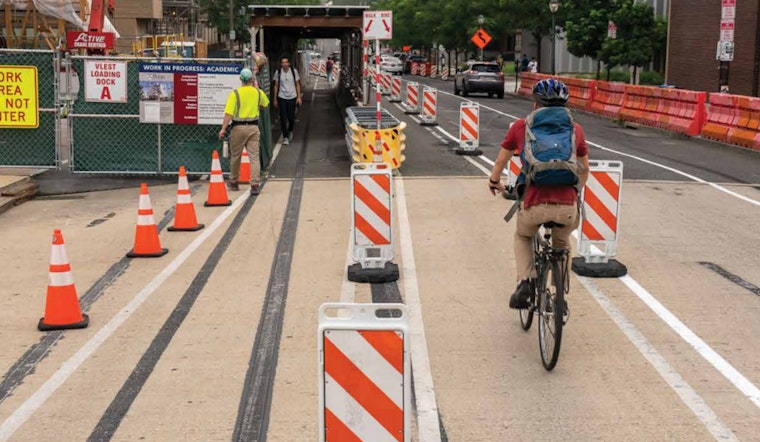The streets of Philadelphia are set to become safer and more navigable for cyclists during the throes of construction, thanks to newly released guidelines by the city. The City of Philadelphia’s Department of Streets and the Office of Transportation and Infrastructure Systems (OTIS) have crafted a Temporary Bike Access Routes (TBAR) Guide, specifically designed to ensure that when buildings rise and roads are repaired, cyclists won’t be left navigating the perilous detours of bygone days. According to the
City of Philadelhpia
official announcement, this guide marks the city’s initial effort to standardize how bike lanes and routes are handled in construction zones.
“The goal of the TBAR guide is to provide guidance to protect people biking with safe accommodations in active construction zones without being diverted into traffic or onto sidewalks,” Commissioner Kristin Del Rossi stated. The essentials of these guidelines is that they set forth clear rules for maintaining and even improving bike lanes and paths when they fall within the scope of construction projects. This initiative puts forth a distinct protocol to be followed by entities ranging from small developers to large construction firms whenever their work infringes on the public right-of-way utilized by cyclists, as per
City of Philadelphia
.
It’s more than just a set of good intentions—the Department of Streets will be incorporating TBAR requirements into the permits it issues for street closures due to construction. This means that any time a project’s scope includes bike lanes, there has to be a Maintenance and Protection of Traffic Plan (MPT) submitted and approved. This plan must detail precisely how cyclists will continue to have safe passage through or around the construction site.
The TBAR Guide is comprehensive, laying out a checklist of mandatory requirements and offering design guidance for various common construction scenarios. Among the listed requirements, temporary bike facilities must not only retain clear passage for cyclists but be free from construction debris and other hazards, including misplaced equipment and vehicles. These makeshift routes need to be implemented from the first hammer swing, and in the event of emergency work, within three days. Philadelphia residents play a role too—they’re encouraged to keep vigilant and report any issues to Philly311, effectively becoming the eyes and ears on the ground to ensure compliance. Failure to adhere to these requirements could result in penalties ranging from fines to the rescission of construction permits, proving that the city means business when it comes to the safety and mobility of its biking community.
Note: Thank you for visiting our website! We strive to keep you informed with the latest updates based on expected timelines, although please note that we are not affiliated with any official bodies. Our team is committed to ensuring accuracy and transparency in our reporting, verifying all information before publication. We aim to bring you reliable news, and if you have any questions or concerns about our content, feel free to reach out to us via email. We appreciate your trust and support!



Leave a Reply